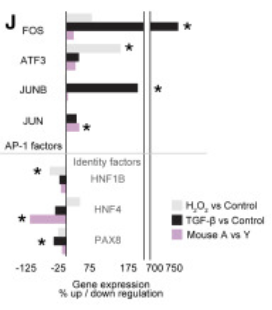Klotho block TGF-β leading to prevention of fibrosis and stem cell exhaustion
I’m assuming this paper is what got you wondering this?
Science Magazine
Scientists present a new strategy to inhibit the protein TGF-beta—a core driver of organ fibrosis that shows promise in mice and could prove safer and less toxic than previous strategies.
Editor’s summary
Transforming growth factor–β (TGF-β) drives fibrosis in many tissues, but treatments that globally inhibit TGF-β signaling affect the immune system and are cardiotoxic. Jackson et al. developed an antibody that specifically bound to the latent form of TGF-β1 presented in the extracellular matrix and prevented its release. The antibody did not have toxic effects in mice and did not bind to latent complexes of TGF-β2 or TGF-β3 or to the latent forms of TGF-β1 presented on immune cells. In two rodent models of kidney fibrosis, systemic treatment with the antibody reduced fibrosis. The specificity of this approach may enable the safe targeting of TGF-β to treat fibrotic diseases (see also the Focus by Hinz). —Annalisa M. VanHook
TGF-beta1 is crucial for survival in neonatal mice, so at least in some trivial sense, it is context dependent.
Although 50% of TGF-β1 −/− and 25% of TGF-β1+/− embryos experience prenatal demise, at birth TGF-β1 −/− mice are normally formed and indistinguishable from +/+ and +/− littermates until postnatal d 10. Thereafter, TGF-β1 −/− mice exhibit a progressive wasting syndrome that results from inflammation involving several organs that invariably eventuates in death by postnatal d 30 [ref]
Meanwhile in C. Elegans, the small molecule TGF-beta receptor inhibitor RepSox gives a nice 31.6% lifespan increase [ref]. RepSox would certainly be interesting to test in the ITP. It has been administered to mice, where it was found to promote transdifferentiation of enteric glia to neurons. [ref]
Re fibrosis, the valvulopathies seen with serotonergic drugs like fenfluramine and potentially psychedelics are believed to depend on TGF-beta signaling. [ref]
It does appear that plasma levels of active TGF-beta increase in elderly subjects. [ref]. Also, the levels TGF-beta1 production by cultured mesothelial peritoneal cells correlates inversely with their replicative lifespan. [ref]
rs1800471 can alter the coding sequence of TGF-beta1 protein, and the C allele (which codes for proline rather than arginine) is depleted in Italian centenarians relative to young controls [ref], and the C/G heterozygotes seem to have worse fibrotic progression of hepatitis C than G/G homozygotes [ref].
I don’t have time to read it, but this looks like a relevant review: Complex Interplay Between Aging and Cancer: Role of TGF-β Signaling
Lastly, see this recent work: The activity of early-life gene regulatory elements is hijacked in aging through pervasive AP-1-linked chromatin opening. They showed that treating adult human kidney tubular cells with TGF-beta for 48 hours can induce changes in chromatin accessibility similar to those seen in aging, as well as induction of AP-1 subunits (which may produce said changes in accessibility).

" Transforming growth factor β1 (TGFβ1) through up-regulation of IL-11, stimulates collagen production and is important in wound healing. However dysregulation of TGFβ1 and downstream IL-11 is associated with fibrotic diseases hence inhibition of IL-11 may have utility in treating fibrosis.[10]
There’s a Marek blood test but idk if it meets quality standards or WHAT isoforms it measures
IL-11 is downstream of TGF-β1 and mediates the pro-fibrotic effects of TGF-β1. There are TGF-β1 inhibitors available, and it would be interesting to see whether inhibition of TGF-β1 mirrors the protective effects of inhibiting IL-11. An anti-TGF-β antibody showed metabolic benefits in mouse models of leptin-deficient and diet-induced hashtag#obesity (Yadav et al., Cell Metabolism, 2011).